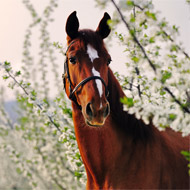EHV-1 neurological case in Worcestershire

‘The AHT are in regular contact with the veterinary surgeons involved, providing advice on outbreak management and diagnostic surveillance to minimise onward transmission.' (stock photo)
The Animal Health Trust (AHT) has confirmed an outbreak of equine herpes virus (EHV-1) neurological disease at a premises in Worcestershire.
An attending veterinary surgeon collected blood samples after the affected animal presented with ataxia on 24 February 2017.
The presumptive diagnosis was made based on the raised serum antibody titres against EHV-1 and EHV-4, using the complement fixation test (CFT), together with no history of recent vaccination.
AHT said in a statement: ‘The AHT are in regular contact with the veterinary surgeons involved, providing advice on outbreak management and diagnostic surveillance to minimise onward transmission.
‘Biosecurity measures, including quarantine of the affected premises and further serological and qPCR monitoring, have been implemented in accordance with the HBLB Codes of Practice and will be continued as necessary. This outbreak is being closely monitored by all vets involved.’
The outbreak was confirmed on 1 March and as of today (3 March) no further cases of EHV-1 have occurred.



 The Federation of Independent Veterinary Practices (FIVP) has announced a third season of its podcast, Practice Matters.
The Federation of Independent Veterinary Practices (FIVP) has announced a third season of its podcast, Practice Matters.